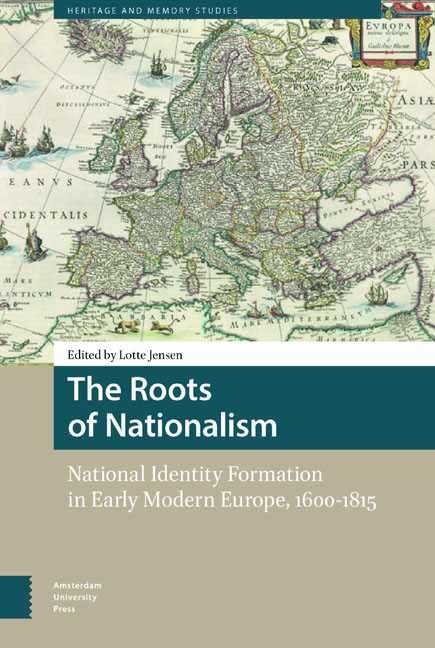Book contents
- Frontmatter
- Contents
- The Roots of Nationalism: Introduction
- Part One The Modernist Paradigm Contested
- Part Two The Genealogy of National Identity
- Part Three Negative Mirror Imaging
- Part Four Maps, Language and Canonisation
- Part Five Nation in the Age of Revolution
- List of Illustrations
- List of Contributors
- Index
13 - Preserving the Past and Constructing a Canon: Defining National Taste and Tradition in an Eighteenth-Century Cabinet of Literary Curiosities
Published online by Cambridge University Press: 03 February 2021
- Frontmatter
- Contents
- The Roots of Nationalism: Introduction
- Part One The Modernist Paradigm Contested
- Part Two The Genealogy of National Identity
- Part Three Negative Mirror Imaging
- Part Four Maps, Language and Canonisation
- Part Five Nation in the Age of Revolution
- List of Illustrations
- List of Contributors
- Index
Summary
On the 15th of September, 1802, the Bataafsche Maatschappij voor Taal- en Dichtkunde (Batavian Society for Language and Poetry) announced that it would hold a scholarly competition to address an important issue in Dutch literary culture: ‘What have been the advances and what have been the setbacks in Dutch poetry over the course of the eighteenth century when compared to earlier ages?’ Three years later, the society determined that the decisive answer to this question had been given by Jeronimo de Vries (1776- 1853), who duly received an honorary gold medal. De Vries's submission was no small achievement, for it constituted one of the first elaborate overviews of Dutch literary history, ranging from the sixteenth century to the early nineteenth century, in an effort to provide a thoroughly contextualised interpretation of the development of eighteenth-century Dutch literature. While the question that the Batavian Society had formulated was fairly unbiased, De Vries's four-volume answer can hardly be described as exhibiting an even-handed approach: after exalting the literary heroes of the Dutch Golden Age, De Vries could characterise the generations that succeeded them only as the deplorably untalented progeny of the seventeenth-century masters.
Like many of his contemporaries, De Vries espoused a strongly cyclical view of history, which he also applied to his classification of the different eras in the development of Dutch literature. In his account, the last decades of the seventeenth century marked the end of a golden age and could be followed only by a period of decline in which ‘nearly all bravery, exaltation, rhetoric and originality was maimed and disfigured’ – or to put it differently, the Dutch literary ‘storehouse seemed completely depleted’. De Vries pointed to the dominance of the French literary tradition in the Dutch Republic as one of the principal reasons for this appalling loss of authenticity. As Nicolaas van Kampen (1776-1839) also avowed, the Dutch literati contended with a persistent ‘lack of self-esteem’ that manifested itself in the ‘both ludicrous and pointless imitation of alien manners’, leaving little – if any – room for a national literary tradition to flourish.
- Type
- Chapter
- Information
- The Roots of NationalismNational Identity Formation in Early Modern Europe, 1600–1815, pp. 251 - 270Publisher: Amsterdam University PressPrint publication year: 2016



